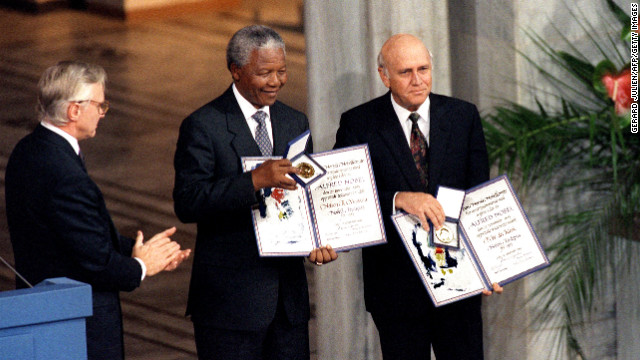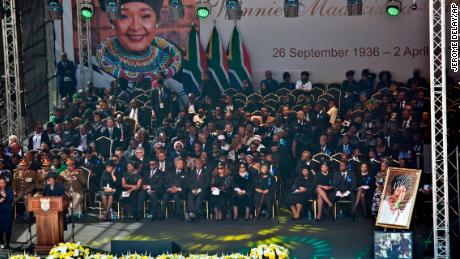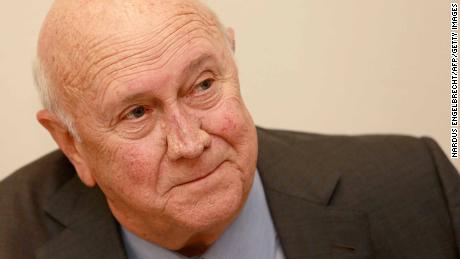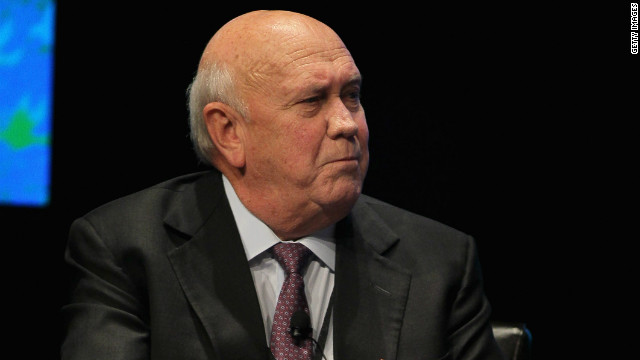The scandal-tainted reign of Jacob Zuma that dragged the rainbow nation's reputation and economy into the gutter is finally over, and F.W. de Klerk, who was president from 1989 to 1994, could not be happier with his replacement."Mr. Cyril Ramaphosa has seen life from all sides," said de Klerk, talking to CNN at the Global Leadership Foundation in London. "He has been a trade unionist. He has been a politician — he was the main negotiator for our new constitution — and then he broke away from politics for a number of years and became the third richest black South African in an honest and transparent way.""Ramaphosa understands business, he understands the economy, and he is committed to achieving economic growth."De Klerk, 82, remembers the new president as a formidable sparring partner on the African National Congress (ANC) side during the negotiations to end apartheid, for which he and Nelson Mandela shared the Nobel Peace Prize in 1993. De Klerk was also impressed by Ramaphosa's role in co-writing the National Development Plan that outlined a vision to tackle poverty and inequality."If they adhere to that plan I have no doubt the economy will grow impressively in South Africa," he said.
Back from the brink
 There is certainly room for improvement. South Africa's GDP plummeted from a continent-leading $417 billion in 2011 to under $300 billion in 2016, narrowly avoiding recession.De Klerk is equally pained by what he saw as attacks on the constitution that he helped to create during the Zuma years, such as efforts to undermine the independence of the courts and the National Prosecuting Authority. Zuma is facing corruption charges although he denies wrongdoing.
There is certainly room for improvement. South Africa's GDP plummeted from a continent-leading $417 billion in 2011 to under $300 billion in 2016, narrowly avoiding recession.De Klerk is equally pained by what he saw as attacks on the constitution that he helped to create during the Zuma years, such as efforts to undermine the independence of the courts and the National Prosecuting Authority. Zuma is facing corruption charges although he denies wrongdoing.  "Zuma was not a constitutionalist," said de Klerk. "He neglected upholding the constitution on many occasions regarding many issues and that has put the constitution under great pressure. But so far it is standing up and the Constitutional Court has made major decisions (against Zuma) that are pulling South Africa back from the brink."De Klerk has few regrets about the historic agreements that he forged with Mandela and the ANC. "The essence of good settlement is that there was no winner," he said, adding that he is still branded a traitor by Afrikaners and an apartheid apologist by black South Africans.
"Zuma was not a constitutionalist," said de Klerk. "He neglected upholding the constitution on many occasions regarding many issues and that has put the constitution under great pressure. But so far it is standing up and the Constitutional Court has made major decisions (against Zuma) that are pulling South Africa back from the brink."De Klerk has few regrets about the historic agreements that he forged with Mandela and the ANC. "The essence of good settlement is that there was no winner," he said, adding that he is still branded a traitor by Afrikaners and an apartheid apologist by black South Africans. One regret is that he was unable to secure greater checks and balances on the party in power, which might have strengthened South Africa's democracy and curbed the alleged excesses of Zuma's regime.He says he had hoped to introduced a multi-party council that the government would have to consult on any matter of national importance, and eventually quit the government in 1996 after this was decisively rejected.
One regret is that he was unable to secure greater checks and balances on the party in power, which might have strengthened South Africa's democracy and curbed the alleged excesses of Zuma's regime.He says he had hoped to introduced a multi-party council that the government would have to consult on any matter of national importance, and eventually quit the government in 1996 after this was decisively rejected.
The land question
 South Africa's constitution, a foundation of de Klerk's legacy, could face a new challenge under Ramaphosa's leadership. The new president has committed to radical land reform that was the founding principle of the ANC in 1912. More than 73% of South African farmland is owned by the white minority that comprises just eight percent of the population, according to industry group Agri SA, and parliament recently voted to redress the imbalance by amending the constitution to allow expropriation without compensation. De Klerk fears this would deter investors and threaten Ramaphosa's stated goal of raising $100 billion in foreign investment. But he takes heart in the president's caveats that he would only support expropriation where it did not damage the economy or jeopardize the food supply, and suggests that meaningful reform can be consensual."I expect that in the end the ANC will say it is not necessary to amend the constitution," he said. "I think there will be a focus on land that is lying fallow…and on land already belonging to the government. I think there should be greater focus on acquiring land through the normal market because there are many farms for sale and the government should make ample amounts available to buy those farms and settle black farmers on them with proper support, mentoring and assistance on the funding side."
South Africa's constitution, a foundation of de Klerk's legacy, could face a new challenge under Ramaphosa's leadership. The new president has committed to radical land reform that was the founding principle of the ANC in 1912. More than 73% of South African farmland is owned by the white minority that comprises just eight percent of the population, according to industry group Agri SA, and parliament recently voted to redress the imbalance by amending the constitution to allow expropriation without compensation. De Klerk fears this would deter investors and threaten Ramaphosa's stated goal of raising $100 billion in foreign investment. But he takes heart in the president's caveats that he would only support expropriation where it did not damage the economy or jeopardize the food supply, and suggests that meaningful reform can be consensual."I expect that in the end the ANC will say it is not necessary to amend the constitution," he said. "I think there will be a focus on land that is lying fallow…and on land already belonging to the government. I think there should be greater focus on acquiring land through the normal market because there are many farms for sale and the government should make ample amounts available to buy those farms and settle black farmers on them with proper support, mentoring and assistance on the funding side."
Race relations
There were once fears that the passing of Nelson Mandela could spark a resurgence of racial tensions and violence in South Africa, but de Klerk believes that his legacy acts as a powerful force for healing."The country was united in its appreciation of Mandela as a very special person and leader," says de Klerk. "The whole country including supporters and political opponents came together in mourning him. His death created a moment of unity that still persists."In that spirit, de Klerk is happy to pay tribute to his "former enemy" the late Winnie Mandela."I always found her to be a very strong personality but with a human side," he said, recalling that she attended the funeral of his ex-wife Marike and encouraged his work in government. "I don't think the ANC gave her the credit she was due," he added. "There may have been an element of patriarchy."But the former president does not pretend that South Africa's deep divisions have healed. De Klerk courted controversy in a 2012 interview with CNN's Christiane Amanpour in which he suggested separatism could be legitimate in principle, if immoral in practice.
He does not disavow that statement and suggests that around 30% of the Afrikaner population still favor separatism over multiracial integration.
Managing diversity
De Klerk's foundation is lobbying the government to build bridges with South Africa's white minority, including through greater provision for mother tongue education, in the hope of lowering barriers and fostering integration. He is also interested in applying the lessons of South Africa around the world, from the quest for a solution to the Israeli-Palestinian conflict, to the resurgence of white nationalism in the US."Management of diversity is one of the great challenges for this century," he says. "All countries are becoming more diverse (and) I think diversity is being mismanaged.""As we have individual human rights, we need international conventions to ensure that minorities are properly accommodated in their countries and that their linguistic, cultural and religious rights are recognized more properly than they are."
Original Article
[contf]
[contfnew]

CNN
[contfnewc]
[contfnewc]








